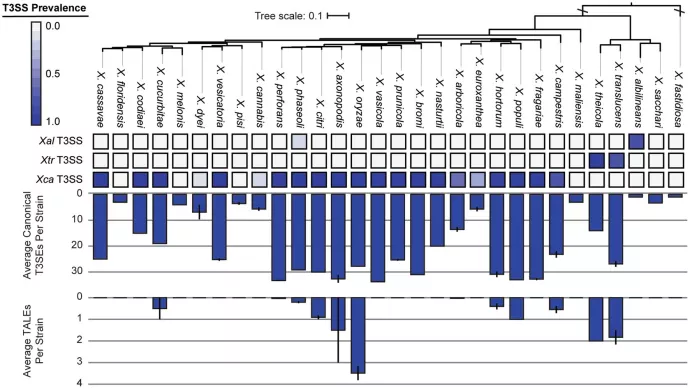Viplav Agarwal, PhD student, First 1st Authored Paper

Viplav Agarwal, PhD student from Dillon Lab published his first 1st authored paper: Pangenome insights into the diversification and disease specificity of worldwide Xanthomonas outbreaks in Frontiers in Microbiology
https://doi.org/10.3389/fmicb.2023.1213261
Many pathogens infect plants and cause devastating diseases which can result in significant agricultural losses. In this study, we focused on the bacterial genus Xanthomonas, which causes disease outbreaks in hundreds of plant species, including economically important crops. Despite thousands of sequenced strains from this genus in various studies, there is no comprehensive phylogeny for the genus, with some species designations in public databases still relying on phenotypic similarities and representative sequence typing.

We analyzed 1,910 diverse Xanthomonas genomes using a pangenome approach to understand their evolutionary relationships, distribution of virulence-associated genes, and rates of horizontal gene transfer. We found broadly conserved classes of virulence factors and observed considerable diversity in Type 3 Secretion Systems (T3SSs) and Type 3 Secreted Effectors (T3SE) repertoires among different Xanthomonas species (see figure). We also corrected misclassified strains and discovered evidence of both monophyletic host specificity and convergent evolution of phylogenetically distant strains targeting the same host. We detected many ancestral and recent recombination events which have played a role in maintaining genetic cohesion within the Xanthomonas genus. Understanding the evolutionary history and relationship of virulence factors with host specificity of Xanthomonas species provides valuable insights into how these pathogens switch between hosts, which can aid in developing more effective resistance strategies against these highly virulent pathogens.
Viplav’s Bio:
I am a second-year PhD student in the Dillon lab studying the evolution of plant-pathogenic bacteria through genetics and genomics. Before this, I completed an integrated Bachelors and Masters degree from the Indian Institute of Science Education and Research, Bhopal, India. In my spare time I enjoy reading, cooking and PC gaming.
Congratulations!
